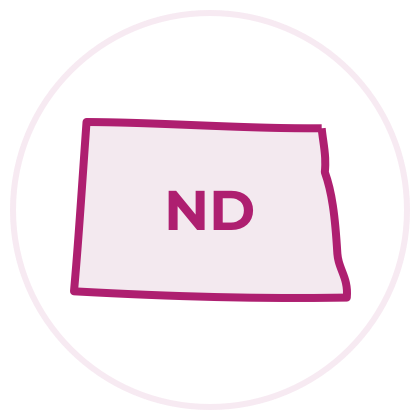Pre-Service Training
Prospective foster and adoptive parents are trained using the 27-hour Parents Resource for Information Development and Education (PRIDE) pre-service training program. Relative caregivers are not required to attend training before placement, but those who may need financial support to meet the child’s needs from the Federal IV-E Guardian Assistance Program (GAP) must be licensed as a foster parent and attend a modified version of the PRIDE pre-service training that consists of three hours of training. Parents who are transitioning to adoption are not required to complete the training again unless the adoption agency has a specific reason to make this request.
Services Offered Through the State’s Post-Permanency Support Program
Post-permanency services for adoptive and guardianship families in North Dakota are provided through the North Dakota Post Adoption Network, contracted through the Adults Adopting Special Kids (AASK) Program and administered by Catholic Charities North Dakota. The North Dakota Post Adoption Network provides family-centered interventions to empower and strengthen families to become self-sufficient in their communities.
Services include:
In 2023, the Network served 589 clients, including 97 who received one-on-one supportive services.
For more information, visit https://ndpostadopt.org/.
Geographic Area Covered
Post-permanency services are available throughout the state. There are four post permanency workers, one in each quadrant of the state. Similar services are offered throughout the state, however may be modified locally based on the needs of the local population.
Eligible Population for the Overall Post-Permanency Program
Accessibility
Issues of race, culture, and ethnicity that may affect delivery of services are considered during the assessment process to allow interviews to be conducted in a culturally responsive manner. Another important part of the assessment process is information related to tribal connections and cultural considerations and language considerations. The family assessment also asks questions about concerns related to interracial or transcultural adoption issues the family may be experiencing.
The North Dakota Post Adopt Network can provide support to families to enroll a child with a tribal nation after finalization has occurred. Requests for services in languages other than English will be accommodated upon request. Other specialized services for groups such as children in interracial families, LGBTQ2S+ families or youth, and adoptive/guardianship families who are kin consist of information and referral to educational materials and programs that can meet their needs.
Outreach and Engagement
The state shares information about the post-permanency services through the following outreach:
- Adoption workers introduce post-adoption coordinators to families prior to finalization
- Adoption staff can identify families who could benefit from services prior to finalization and offer them services
- Social media and website outreach
- Outreach at community events
- Outreach to community partners who interface with families such as teachers and mental and behavioral health professionals
- Collaboration with regional recruitment and retention coalitions and infant and intercountry adoption agencies
Upon finalization, families are added to a distribution mailing list and email list. The North Dakota Post Adopt Network will check in with adoptive and guardianship families individually at the following points after finalization:
- within one month of finalization
- six months after finalization
- one year after finalization
- one-on-a-half years after finalization
- two years after finalization
At the two-year follow up, the post adopt coordinator asks the family if future follow-up calls are welcome and will continue calls if desired. The North Dakota Post Adopt Network also sends newsletters once a month to families to notify recipients of local events, trainings, and support groups throughout the state.
Outreach occurs in all areas of the state and are tracked by management staff. Outreach to families may look different from location to location based on the needs of local families.
How the Post-Permanency Program Is Operated
Notes About Who Provides Which Service(s)
The state contracts with Catholic Charities North Dakota to provide all services statewide.
Adoption/Guardianship Assistance/Subsidy Review and Changes
The adoptive parent must submit the required review information either every year or every two years depending on the type of agreement that has been signed. If a child receives specialized services/circumstances subsidy (excess payment above the traditional foster care rate) the review process is held every year. If the services are not specialized the review process happens every other year. Guardians must submit required review information annually to Children and Family Services to continue receiving a guardianship subsidy.
Adoptive families can request a change in the adoption assistance agreement any time there is a documented change in the child’s needs or the family’s circumstances. Parents must make the request for modification in writing to the Children and Family Services Foster Care Sub Adopt Unit (CFSFCSA Unit) that administers the adoption assistance. The request must detail the specific reasons for the requested change, including the rationale for the specific amount requested. The CFSFCSA Unit will negotiate any revision to the agreement and may request additional documentation. The same process is true for guardianship but the request must be submitted to the CFS Guardianship Unit.
Tracking Adoption/Guardianship Discontinuity
The state’s case management system has questions related to whether the child was previously adopted, which supports the tracking of discontinuity. The questions include whether a child was ever adopted, age at adoption, date of last finalized adoption, child adopted from a foreign country, placing agency, prior guardianship before current out-of-home care episode, and prior guardianship date. North Dakota does not regularly review this information, but an ad hoc report can be requested when needed.
Post-Permanency Program Spending (FY 2023)
Funding Sources for the Post-Permanency Program (FY 2023)
- Adoption savings (reported on CB 496 Part 4 – Annual Adoption Savings Report)
- Title IV-B, Part 2 (Promoting Safe and Stable Families/PSSF)
- State funds


